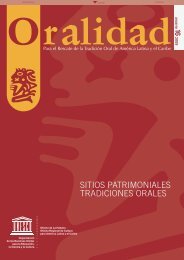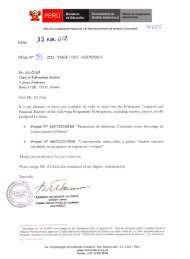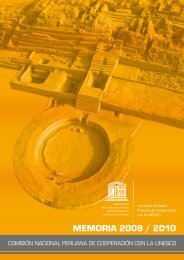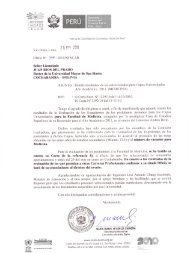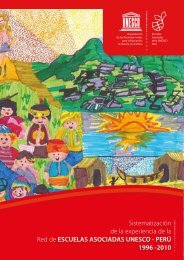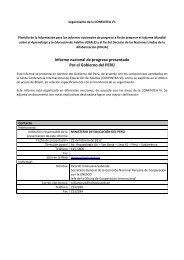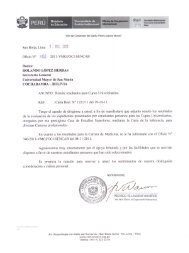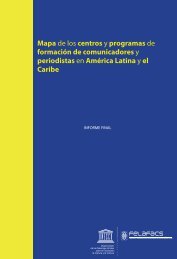- Page 9 and 10:
CONTENTSChapter 4The aid compact: f
- Page 12 and 13:
100CONTENTS2Education for All Globa
- Page 15 and 16:
HIGHLIGHTS OF THE EFA REPORT 2010Hi
- Page 17 and 18:
OVERVIEW© XINHUA/Gamma/Eyedea Pres
- Page 19 and 20:
OVERVIEWChapter 2Monitoring progres
- Page 21 and 22:
OVERVIEWis open to question. Many n
- Page 23 and 24:
OVERVIEWon the scale of marginaliza
- Page 25 and 26:
OVERVIEWhome from the language of i
- Page 27 and 28:
OVERVIEW© Crispin Hughes/PANOSthe
- Page 29 and 30:
OVERVIEWThe reform process starts b
- Page 31 and 32:
Education for All Global Monitoring
- Page 33 and 34:
EDUCATION AT RISK: THE IMPACT OF TH
- Page 35 and 36:
EDUCATION AT RISK: THE IMPACT OF TH
- Page 37 and 38:
EDUCATION AT RISK: THE IMPACT OF TH
- Page 39 and 40:
EDUCATION AT RISK: THE IMPACT OF TH
- Page 41 and 42:
EDUCATION AT RISK: THE IMPACT OF TH
- Page 43 and 44:
EDUCATION AT RISK: THE IMPACT OF TH
- Page 45 and 46:
EDUCATION AT RISK: THE IMPACT OF TH
- Page 47 and 48:
EDUCATION AT RISK: THE IMPACT OF TH
- Page 49 and 50:
EDUCATION AT RISK: THE IMPACT OF TH
- Page 51 and 52:
EDUCATION AT RISK: THE IMPACT OF TH
- Page 53 and 54:
Education for All Global Monitoring
- Page 55 and 56:
PROGRESS TOWARDS THE EFA GOALSIntro
- Page 57 and 58:
PROGRESS TOWARDS THE EFA GOALSEarly
- Page 59 and 60:
PROGRESS TOWARDS THE EFA GOALSEarly
- Page 61 and 62:
PROGRESS TOWARDS THE EFA GOALSEarly
- Page 63 and 64:
PROGRESS TOWARDS THE EFA GOALSEarly
- Page 65 and 66:
PROGRESS TOWARDS THE EFA GOALSEarly
- Page 67 and 68:
PROGRESS TOWARDS THE EFA GOALSEarly
- Page 69 and 70:
PROGRESS TOWARDS THE EFA GOALSUnive
- Page 71 and 72:
PROGRESS TOWARDS THE EFA GOALSUnive
- Page 73 and 74:
PROGRESS TOWARDS THE EFA GOALSUnive
- Page 75 and 76:
PROGRESS TOWARDS THE EFA GOALSUnive
- Page 77 and 78:
PROGRESS TOWARDS THE EFA GOALSUnive
- Page 79 and 80:
PROGRESS TOWARDS THE EFA GOALSUnive
- Page 81 and 82:
PROGRESS TOWARDS THE EFA GOALSUnive
- Page 83 and 84:
PROGRESS TOWARDS THE EFA GOALSUnive
- Page 85 and 86:
PROGRESS TOWARDS THE EFA GOALSUnive
- Page 87 and 88:
PROGRESS TOWARDS THE EFA GOALSUnive
- Page 89 and 90:
PROGRESS TOWARDS THE EFA GOALSUnive
- Page 91 and 92:
PROGRESS TOWARDS THE EFA GOALSYouth
- Page 93 and 94:
PROGRESS TOWARDS THE EFA GOALSYouth
- Page 95 and 96:
PROGRESS TOWARDS THE EFA GOALSYouth
- Page 97 and 98:
PROGRESS TOWARDS THE EFA GOALSYouth
- Page 99 and 100:
PROGRESS TOWARDS THE EFA GOALSYouth
- Page 101 and 102:
PROGRESS TOWARDS THE EFA GOALSYouth
- Page 103 and 104:
PROGRESS TOWARDS THE EFA GOALSYouth
- Page 105 and 106:
PROGRESS TOWARDS THE EFA GOALSYouth
- Page 107 and 108:
PROGRESS TOWARDS THE EFA GOALSYouth
- Page 109 and 110:
PROGRESS TOWARDS THE EFA GOALSYouth
- Page 111 and 112:
PROGRESS TOWARDS THE EFA GOALSYouth
- Page 113 and 114:
PROGRESS TOWARDS THE EFA GOALSYouth
- Page 115 and 116:
PROGRESS TOWARDS THE EFA GOALSYouth
- Page 117 and 118:
PROGRESS TOWARDS THE EFA GOALSYouth
- Page 119 and 120:
PROGRESS TOWARDS THE EFA GOALSThe q
- Page 121 and 122:
PROGRESS TOWARDS THE EFA GOALSThe q
- Page 123 and 124:
PROGRESS TOWARDS THE EFA GOALSThe q
- Page 125 and 126:
PROGRESS TOWARDS THE EFA GOALSThe q
- Page 127 and 128:
PROGRESS TOWARDS THE EFA GOALSThe q
- Page 129 and 130:
PROGRESS TOWARDS THE EFA GOALSThe q
- Page 131 and 132:
PROGRESS TOWARDS THE EFA GOALSThe q
- Page 133 and 134:
PROGRESS TOWARDS THE EFA GOALSEstim
- Page 135 and 136:
PROGRESS TOWARDS THE EFA GOALSEstim
- Page 137 and 138:
PROGRESS TOWARDS THE EFA GOALSEstim
- Page 139 and 140:
PROGRESS TOWARDS THE EFA GOALSEstim
- Page 141 and 142:
PROGRESS TOWARDS THE EFA GOALSEstim
- Page 143 and 144:
PROGRESS TOWARDS THE EFA GOALSEstim
- Page 145 and 146:
PROGRESS TOWARDS THE EFA GOALSEstim
- Page 147 and 148:
Education for All Global Monitoring
- Page 149 and 150:
REACHING THE MARGINALIZEDIntroducti
- Page 151 and 152:
REACHING THE MARGINALIZEDIntroducti
- Page 153 and 154:
REACHING THE MARGINALIZEDMeasuring
- Page 155 and 156:
REACHING THE MARGINALIZEDMeasuring
- Page 157 and 158:
REACHING THE MARGINALIZEDMeasuring
- Page 159 and 160:
REACHING THE MARGINALIZEDMeasuring
- Page 161 and 162:
REACHING THE MARGINALIZEDMeasuring
- Page 163 and 164:
REACHING THE MARGINALIZEDMeasuring
- Page 165 and 166:
REACHING THE MARGINALIZEDMeasuring
- Page 167 and 168:
REACHING THE MARGINALIZEDMeasuring
- Page 169 and 170:
REACHING THE MARGINALIZEDMeasuring
- Page 171 and 172:
REACHING THE MARGINALIZEDMeasuring
- Page 173 and 174:
REACHING THE MARGINALIZEDMeasuring
- Page 175 and 176:
REACHING THE MARGINALIZEDMeasuring
- Page 177 and 178:
REACHING THE MARGINALIZEDMeasuring
- Page 179 and 180:
REACHING THE MARGINALIZEDGetting le
- Page 181 and 182:
REACHING THE MARGINALIZEDGetting le
- Page 183 and 184:
REACHING THE MARGINALIZEDGetting le
- Page 185 and 186:
REACHING THE MARGINALIZEDGetting le
- Page 187 and 188:
REACHING THE MARGINALIZEDGetting le
- Page 189 and 190:
REACHING THE MARGINALIZEDGetting le
- Page 191 and 192:
REACHING THE MARGINALIZEDGetting le
- Page 193 and 194:
REACHING THE MARGINALIZEDGetting le
- Page 195 and 196:
REACHING THE MARGINALIZEDGetting le
- Page 197 and 198:
REACHING THE MARGINALIZEDGetting le
- Page 199 and 200:
REACHING THE MARGINALIZEDGetting le
- Page 201 and 202:
REACHING THE MARGINALIZEDLevelling
- Page 203 and 204:
REACHING THE MARGINALIZEDLevelling
- Page 205 and 206:
REACHING THE MARGINALIZEDLevelling
- Page 207 and 208:
REACHING THE MARGINALIZEDLevelling
- Page 209 and 210:
REACHING THE MARGINALIZEDLevelling
- Page 211 and 212:
REACHING THE MARGINALIZEDLevelling
- Page 213 and 214:
REACHING THE MARGINALIZEDLevelling
- Page 215 and 216:
REACHING THE MARGINALIZEDLevelling
- Page 217 and 218:
REACHING THE MARGINALIZEDLevelling
- Page 219 and 220:
REACHING THE MARGINALIZEDLevelling
- Page 221 and 222: REACHING THE MARGINALIZEDLevelling
- Page 223 and 224: REACHING THE MARGINALIZEDLevelling
- Page 225 and 226: REACHING THE MARGINALIZEDLevelling
- Page 227 and 228: REACHING THE MARGINALIZEDLevelling
- Page 229 and 230: Education for All Global Monitoring
- Page 231 and 232: THE AID COMPACT: FALLING SHORT OF C
- Page 233 and 234: THE AID COMPACT: FALLING SHORT OF C
- Page 235 and 236: THE AID COMPACT: FALLING SHORT OF C
- Page 237 and 238: THE AID COMPACT: FALLING SHORT OF C
- Page 239 and 240: THE AID COMPACT: FALLING SHORT OF C
- Page 241 and 242: THE AID COMPACT: FALLING SHORT OF C
- Page 243 and 244: THE AID COMPACT: FALLING SHORT OF C
- Page 245 and 246: THE AID COMPACT: FALLING SHORT OF C
- Page 247 and 248: THE AID COMPACT: FALLING SHORT OF C
- Page 249 and 250: THE AID COMPACT: FALLING SHORT OF C
- Page 251 and 252: THE AID COMPACT: FALLING SHORT OF C
- Page 253 and 254: THE AID COMPACT: FALLING SHORT OF C
- Page 255 and 256: THE AID COMPACT: FALLING SHORT OF C
- Page 257 and 258: THE AID COMPACT: FALLING SHORT OF C
- Page 259 and 260: THE AID COMPACT: FALLING SHORT OF C
- Page 261 and 262: THE AID COMPACT: FALLING SHORT OF C
- Page 263 and 264: THE AID COMPACT: FALLING SHORT OF C
- Page 265 and 266: THE AID COMPACT: FALLING SHORT OF C
- Page 267 and 268: THE AID COMPACT: FALLING SHORT OF C
- Page 269 and 270: THE AID COMPACT: FALLING SHORT OF C
- Page 271: THE AID COMPACT: FALLING SHORT OF C
- Page 275 and 276: THE AID COMPACT: FALLING SHORT OF C
- Page 277 and 278: THE AID COMPACT: FALLING SHORT OF C
- Page 279 and 280: THE AID COMPACT: FALLING SHORT OF C
- Page 281 and 282: THE AID COMPACT: FALLING SHORT OF C
- Page 283 and 284: Education for All Global Monitoring
- Page 285 and 286: RISING TO THE EFA CHALLENGEOvercomi
- Page 287 and 288: RISING TO THE EFA CHALLENGEOvercomi
- Page 289 and 290: RISING TO THE EFA CHALLENGEOvercomi
- Page 291 and 292: Education for All Global Monitoring
- Page 293 and 294: THE EDUCATION FOR ALL DEVELOPMENT I
- Page 295 and 296: THE EDUCATION FOR ALL DEVELOPMENT I
- Page 297 and 298: THE EDUCATION FOR ALL DEVELOPMENT I
- Page 299 and 300: THE EDUCATION FOR ALL DEVELOPMENT I
- Page 301 and 302: THE EDUCATION FOR ALL DEVELOPMENT I
- Page 303 and 304: THE EDUCATION FOR ALL DEVELOPMENT I
- Page 305 and 306: THE EDUCATION FOR ALL DEVELOPMENT I
- Page 307 and 308: SELECTED INTERNATIONAL HUMAN RIGHTS
- Page 309 and 310: EDUCATIONAL EFFECT OF SELECTED SOCI
- Page 311 and 312: STATISTICAL TABLESIntroductionunder
- Page 313 and 314: STATISTICAL TABLESIntroductionLithu
- Page 315 and 316: STATISTICAL TABLESTable 1CurrentUS$
- Page 317 and 318: STATISTICAL TABLESTable 1CurrentUS$
- Page 319 and 320: STATISTICAL TABLESTable 1CurrentUS$
- Page 321 and 322: STATISTICAL TABLESTable 1CurrentUS$
- Page 323 and 324:
STATISTICAL TABLESTable 2YOUTH LITE
- Page 325 and 326:
STATISTICAL TABLESTable 2YOUTH LITE
- Page 327 and 328:
STATISTICAL TABLESTable 2YOUTH LITE
- Page 329 and 330:
STATISTICAL TABLESTable 2YOUTH LITE
- Page 331 and 332:
STATISTICAL TABLESTable 3ACHILD WEL
- Page 333 and 334:
STATISTICAL TABLESTable 3ATuberculo
- Page 335 and 336:
STATISTICAL TABLESTable 3ACHILD WEL
- Page 337 and 338:
STATISTICAL TABLESTable 3ATuberculo
- Page 339 and 340:
STATISTICAL TABLESTable 3BGROSS ENR
- Page 341:
STATISTICAL TABLESTable 3BGROSS ENR
- Page 344 and 345:
01ANNEX02Education for All Global M
- Page 346 and 347:
01ANNEX02Education for All Global M
- Page 348 and 349:
01ANNEX02Education for All Global M
- Page 350 and 351:
01ANNEX02Education for All Global M
- Page 352 and 353:
01ANNEX02Education for All Global M
- Page 354 and 355:
0102ANNEXTable 5Participation in pr
- Page 356 and 357:
10ANNEX02Education for All Global M
- Page 358 and 359:
01ANNEX02Education for All Global M
- Page 360 and 361:
01ANNEX02Education for All Global M
- Page 362 and 363:
01ANNEX02Education for All Global M
- Page 364 and 365:
01ANNEX02Education for All Global M
- Page 366 and 367:
01ANNEX02Education for All Global M
- Page 368 and 369:
01ANNEX02Education for All Global M
- Page 370 and 371:
1002ANNEXTable 7Internal efficiency
- Page 372 and 373:
01ANNEX02Table 7 (continued)DROPOUT
- Page 374 and 375:
01ANNEX02Table 7 (continued)DROPOUT
- Page 376 and 377:
01ANNEX02Table 7 (continued)DROPOUT
- Page 378 and 379:
01ANNEX02Education for All Global M
- Page 380 and 381:
01ANNEX02Education for All Global M
- Page 382 and 383:
01ANNEX02Education for All Global M
- Page 384 and 385:
01ANNEX02Education for All Global M
- Page 386 and 387:
01ANNEX02Education for All Global M
- Page 388 and 389:
01ANNEX02Education for All Global M
- Page 390 and 391:
01ANNEX02Education for All Global M
- Page 392 and 393:
10ANNEX02Education for All Global M
- Page 394 and 395:
01ANNEX02Table 9B. Tertiary educati
- Page 396 and 397:
01ANNEX02Education for All Global M
- Page 398 and 399:
01ANNEX02Table 9B (continued)PERCEN
- Page 400 and 401:
01ANNEX02Education for All Global M
- Page 402 and 403:
01ANNEX02Education for All Global M
- Page 404 and 405:
01ANNEX02Education for All Global M
- Page 406 and 407:
01ANNEX02Education for All Global M
- Page 408 and 409:
01ANNEX02Education for All Global M
- Page 410 and 411:
01ANNEX02Education for All Global M
- Page 412 and 413:
01ANNEX02Education for All Global M
- Page 414 and 415:
01ANNEX02Education for All Global M
- Page 416 and 417:
01ANNEX02Education for All Global M
- Page 418 and 419:
01ANNEX02Education for All Global M
- Page 420 and 421:
10ANNEX02Education for All Global M
- Page 422 and 423:
01ANNEX02Education for All Global M
- Page 424 and 425:
01ANNEX02Education for All Global M
- Page 426 and 427:
1020ANNEXTable 12Trends in basic or
- Page 428 and 429:
2 0 10Education for All Global Moni
- Page 430 and 431:
01ANNEX02Education for All Global M
- Page 432 and 433:
01ANNEX02Education for All Global M
- Page 434 and 435:
01ANNEX02Education for All Global M
- Page 436 and 437:
01ANNEX02Education for All Global M
- Page 438 and 439:
01ANNEX02Education for All Global M
- Page 440 and 441:
01ANNEX02Education for All Global M
- Page 442 and 443:
20Education for All Global Monitori
- Page 444 and 445:
0120ANNEXEducation for All Global M
- Page 446 and 447:
001ANNEX2Education for All Global M
- Page 448 and 449:
100ANNEX2Education for All Global M
- Page 450 and 451:
100ANNEX2Education for All Global M
- Page 452 and 453:
010ANNEX2Education for All Global M
- Page 454 and 455:
0120ANNEXEducation for All Global M
- Page 456 and 457:
010ANNEX2Education for All Global M
- Page 458 and 459:
01ANNEX02Education for All Global M
- Page 460 and 461:
2 0 10Education for All Global Moni
- Page 462 and 463:
0120ANNEXEducation for All Global M
- Page 464 and 465:
010ANNEX2Education for All Global M
- Page 466 and 467:
100ANNEX2Education for All Global M
- Page 468 and 469:
100ANNEX2Education for All Global M
- Page 470 and 471:
100ANNEX2Education for All Global M
- Page 472 and 473:
100ANNEX2Education for All Global M
- Page 474 and 475:
100ANNEX2Education for All Global M
- Page 476 and 477:
100ANNEX2Education for All Global M
- Page 478 and 479:
100ANNEX2Education for All Global M
- Page 480 and 481:
100ANNEX2Education for All Global M
- Page 482 and 483:
100ANNEX2Education for All Global M
- Page 484 and 485:
100ANNEX2Education for All Global M
- Page 486 and 487:
010ANNEX2Education for All Global M
- Page 488 and 489:
100ANNEX2Education for All Global M
- Page 490 and 491:
100ANNEX2Education for All Global M
- Page 492 and 493:
010ANNEX2Education for All Global M
- Page 494 and 495:
010ANNEX2Education for All Global M
- Page 496 and 497:
100ANNEX2Education for All Global M
- Page 498 and 499:
100ANNEX2Education for All Global M
- Page 500 and 501:
12 00ANNEXEducation for All Global
- Page 502 and 503:
0120ANNEXEducation for All Global M
- Page 504 and 505:
0120ANNEXEducation for All Global M
- Page 506 and 507:
0120ANNEXEducation for All Global M
- Page 508 and 509:
0120ANNEXEducation for All Global M
- Page 510 and 511:
0120ANNEXEducation for All Global M
- Page 512 and 513:
0120ANNEXEducation for All Global M
- Page 514 and 515:
0120ANNEXEducation for All Global M
- Page 516 and 517:
0120ANNEXEducation for All Global M
- Page 518 and 519:
0120ANNEXEducation for All Global M
- Page 520 and 521:
0120ANNEXEducation for All Global M
- Page 522 and 523:
0120ANNEXEducation for All Global M
- Page 524 and 525:
0120ANNEXEducation for All Global M





